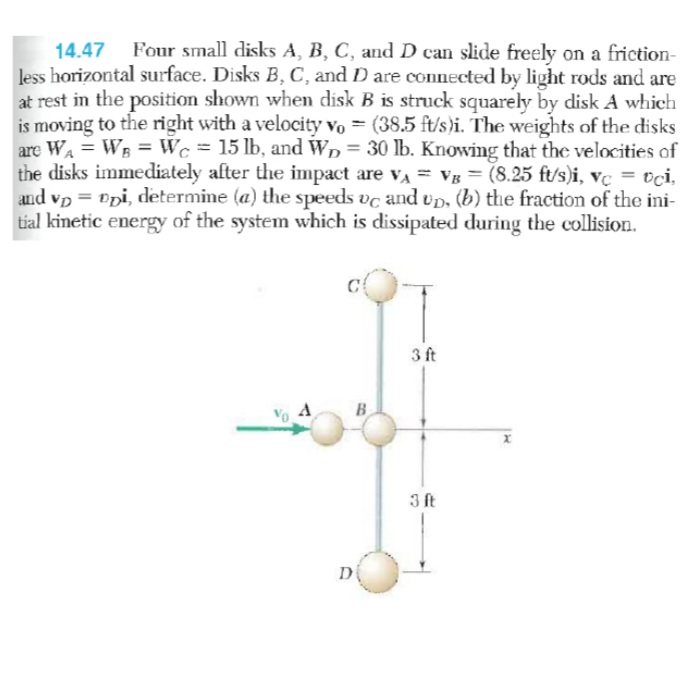
Elements Of Electromagnetics
7th Edition
ISBN: 9780190698614
Author: Sadiku, Matthew N. O.
Publisher: Oxford University Press
expand_more
expand_more
format_list_bulleted
Question

Transcribed Image Text:14.47 Four small disks A, B, C, and D can slide freely on a friction-
less horizontal surface. Disks B, C, and D are connected by light rods and are
at rest in the position shown when disk B is struck squarely by disk A which
is moving to the right with a velocity vo = (38.5 ft/s)i. The weights of the disks
are W₁ = WB = Wc = 15 lb, and WD = 30 lb. Knowing that the velocities of
the disks immediately after the impact are VA VB = (8.25 ft/s)i, vc = vci,
and vp = ppi, determine (a) the speeds vc and up, (b) the fraction of the ini-
tial kinetic energy of the system which is dissipated during the collision.
=
A
D
B
3 ft
3 ft
Expert Solution
This question has been solved!
Explore an expertly crafted, step-by-step solution for a thorough understanding of key concepts.
This is a popular solution
Trending nowThis is a popular solution!
Step by stepSolved in 4 steps with 4 images

Knowledge Booster
Learn more about
Need a deep-dive on the concept behind this application? Look no further. Learn more about this topic, mechanical-engineering and related others by exploring similar questions and additional content below.Similar questions
- Problem 14.2 A 40 lb door with a width of 36 inches has a spring with an unstretched length of 4 in designed to close the door when left open. The spring is anchored as shown below when closed (solid outline is closed, dotted outline is open 90°). If we want the door to have an angular velocity of .2 rad/s upon closing when released from rest at 90°, what should the spring constant of the spring be? (This is the top view of the door below) 3 in (Solution: k = 2.68 lbs/ft=.224 lbs/in) Problem 14.3 4 in M 36 inarrow_forwardRequired information NOTE: This is a multi-part question. Once an answer is submitted, you will be unable to return to this part. A loading car is at rest on a track forming an angle of 25° with the vertical when a force is applied to the cable attached at C. The gross weight of the car and its load is 5495 lb WG, and it acts at point G. Know the tension in the cable connected at C is 5000 lb Tc. Neglect friction between the car and the track. 24 in. 25 25.in. T 25 in. C B 30 in. Determine the distance the car moves in 20 s. (You must provide an answer before moving on to the next part.) The distance the car moves is Iarrow_forwardRequired information NOTE: This is a multi-part question. Once an answer is submitted, you will be unable to return to this part. Two uniform cylinders, each of mass m = 7.5 kg and radius r= 125 mm, are connected by a belt as shown. The system is released from rest when t = 0. B Determine the velocity of the center of cylinder A at t = 3.6 s. The velocity of the center of cylinder A is m/s ↓.arrow_forward
- B7arrow_forwardProblem # 5) A pulley having a moment of inertia of 0.191b-ft-s² is connected to two masses as shown. The masses A and B have linear acceleration of 1.85ft/s² upward and 1.11 ft/s² downward, respectively. Assuming no axle friction, determine (a) the tension forces TA and TB in the cables connecting the masses, and (b) the angular acceleration a of the pulley. Include and present the Free Body Diagram and Inertial Response Diagram as part of the solving process. Hint #1: Hint #2: use mA = 0.1553slugs, and mв = 0.3106slugs treat each body separately 6 in. B 10 lb 10 in. A 5 lbarrow_forwardPart B pleasearrow_forward
arrow_back_ios
arrow_forward_ios
Recommended textbooks for you
 Elements Of ElectromagneticsMechanical EngineeringISBN:9780190698614Author:Sadiku, Matthew N. O.Publisher:Oxford University Press
Elements Of ElectromagneticsMechanical EngineeringISBN:9780190698614Author:Sadiku, Matthew N. O.Publisher:Oxford University Press Mechanics of Materials (10th Edition)Mechanical EngineeringISBN:9780134319650Author:Russell C. HibbelerPublisher:PEARSON
Mechanics of Materials (10th Edition)Mechanical EngineeringISBN:9780134319650Author:Russell C. HibbelerPublisher:PEARSON Thermodynamics: An Engineering ApproachMechanical EngineeringISBN:9781259822674Author:Yunus A. Cengel Dr., Michael A. BolesPublisher:McGraw-Hill Education
Thermodynamics: An Engineering ApproachMechanical EngineeringISBN:9781259822674Author:Yunus A. Cengel Dr., Michael A. BolesPublisher:McGraw-Hill Education Control Systems EngineeringMechanical EngineeringISBN:9781118170519Author:Norman S. NisePublisher:WILEY
Control Systems EngineeringMechanical EngineeringISBN:9781118170519Author:Norman S. NisePublisher:WILEY Mechanics of Materials (MindTap Course List)Mechanical EngineeringISBN:9781337093347Author:Barry J. Goodno, James M. GerePublisher:Cengage Learning
Mechanics of Materials (MindTap Course List)Mechanical EngineeringISBN:9781337093347Author:Barry J. Goodno, James M. GerePublisher:Cengage Learning Engineering Mechanics: StaticsMechanical EngineeringISBN:9781118807330Author:James L. Meriam, L. G. Kraige, J. N. BoltonPublisher:WILEY
Engineering Mechanics: StaticsMechanical EngineeringISBN:9781118807330Author:James L. Meriam, L. G. Kraige, J. N. BoltonPublisher:WILEY

Elements Of Electromagnetics
Mechanical Engineering
ISBN:9780190698614
Author:Sadiku, Matthew N. O.
Publisher:Oxford University Press

Mechanics of Materials (10th Edition)
Mechanical Engineering
ISBN:9780134319650
Author:Russell C. Hibbeler
Publisher:PEARSON

Thermodynamics: An Engineering Approach
Mechanical Engineering
ISBN:9781259822674
Author:Yunus A. Cengel Dr., Michael A. Boles
Publisher:McGraw-Hill Education

Control Systems Engineering
Mechanical Engineering
ISBN:9781118170519
Author:Norman S. Nise
Publisher:WILEY

Mechanics of Materials (MindTap Course List)
Mechanical Engineering
ISBN:9781337093347
Author:Barry J. Goodno, James M. Gere
Publisher:Cengage Learning

Engineering Mechanics: Statics
Mechanical Engineering
ISBN:9781118807330
Author:James L. Meriam, L. G. Kraige, J. N. Bolton
Publisher:WILEY